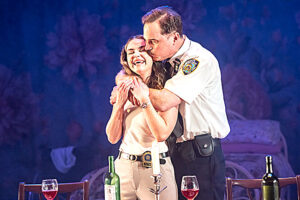
Derry actress Judith Roddy spoke to David Hennessy about the UK premiere of Pulitzer Prize- winning play Between Riverside and Crazy.
Between Riverside and Crazy by Stephen Adly Guirgis, currently premiering at Hampstead Theatre, is a play that deals with issues such as race and addiction.
Directed by Michael Longhurst, Between Riverside and Crazy has already been a Broadway hit and for its opening UK run stars Danny Sapani, of the Black Panther and Star Wars films, as Walter ‘Pops’ Washington.
Since his wife died, ex-cop Walter ‘Pops’ Washington has filled his palatial rent-controlled apartment in one of Manhattan’s most desirable areas with an oddball extended family of petty criminals.
The story finds him besieged by the landlords who want him out, the NYPD who want him to settle his lawsuit against them, and the ladies from the local church who want to save his soul.
But Pops, calm at the eye of a storm, isn’t inclined to bend to the will of any of them.
Among the cast is the Derry actress Judith Roddy who plays Pops’ former partner and protégé, Audrey O’Connor.
Judith’s stage work includes The Silver Tassie, The Plough and the Stars and Translations all at the National Theatre.
She acted opposite Ralph Fiennes in the new David Hare play, Straight Line Crazy.
Judith also starred in the first production of Frank McGuinness’ The Visiting Hour with Stephen Rea.
Roddy and Rea also acted in the late Sam Shepard’s A Particle of Dread.
She also won the Irish Times Best Actress in a Supporting Role Award for her work in The Wild Duck and made a striking guest appearance in Derry Girls playing Ms De Brun, a rebel teacher who had a profound effect on the girls especially Erin.
The cast is completed by Ayesha Antoine, Tiffany Gray, Martins Imhangbe, Daniel Lapaine and Sebastian Orozco.
Judith Roddy told The Irish World: “It’s dark and it’s funny.
“It feels like a play that’s been around for longer than it has.
“Although it’s the UK premiere I’ve had a couple of people say to me, ‘This is a bit like a (Arthur) Miller, like it’s a classic’.
“I was like, ‘No, it’s brand new’.
“The writer has come over.
“He’s such a straight-talking New Yorker.
“He’s been very open about how much of the content is directly related to his own life and the man doesn’t need to reveal any of those privacies or vulnerabilities, and he does.
“He truly is there to share the work and help it grow.”
We saw you in Translations in 2019, is this your first time on stage in London since that production?
“Since Translations this is my first time back on the London stage, yeah.
“Since then I just did the thing with Stephen Rea during lockdown and I did a show in New York.
“I was playing opposite Ralph Fiennes in a new David Hare play called Straight Line Crazy.
“My mother says, ‘You only do plays with crazy in the title’.
“That was a year ago and then I put a pause on theatre for a wee bit and I filmed all last year just to mix it up a bit.
“It’s very nice to be back onstage again.”
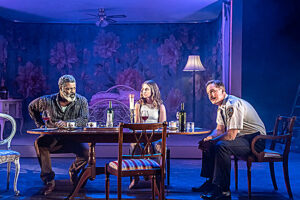
Tell us about your role..
“The play’s sort of centralised around that character (Pops) and there’s a big lapse of time since we’ve seen each other.
“There’s been an incident in his life and I sort of come back into his life.
“It’s really a beautiful relationship.
“They really love each other.
“He’s like her dad and there’s a whole heap of heart in that relationship.
“She’s a detective specialist in the NYPD.
“She was his rookie really.
“She worked with him for 20 years.
“He taught her everything she knows.
“He’s her senior and what we hear of them now in the present is that they were a real duo and she has really succeeded because of him.
“But he’s had to retire.
“She would have known his wife and his son and been very close to the family.
“She would have known all his idiosyncrasies and all the good things about him, all the bad things about him but she’s stepped away from his life and she’s now reappeared eight years later with this lieutenant that she’s engaged to.
“She really wants one man she loves to meet the other man she loves and hoping it will all be received well but it’s quite a fractious household so it doesn’t really go to plan.
“The humour that Stephen has in it is so quick witted.
“The characters in it.
“You’re going, ‘Where do these people come from?’”
There must be a lot of hurt in her relationship with Pops, is there?
“A huge amount, she misses him.
“They both miss each other hugely.
“They have very quick fire between each other.
“They can finish each other’s sentences.
“They bubble with laughter and love but there’s an underlying current of unsaid fractured stuff there which eventually will surface and it’s quite difficult for both of them to sort of move through that because they have to move through the dark bits of their relationship.
“It’s quite painful for her to see this stalwart of a man who’s like a quick decision maker, brilliant at his job, funny, powerful and just to see him fade a little bit because he’s not well. It’s like seeing a relative start to retreat into their elder years.
“She has been in brawls and on the streets so she’s well capable and able, but at the same time it’s incredibly difficult to see someone who taught you everything you know start to fade.”
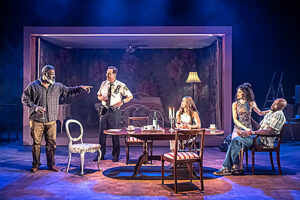
Does Audrey feel responsibility or even guilt seeing what has happened to Pops?
“I think that there’s a huge element of shame.
“That does come up.
“Shame is something that all the characters carry in some different way.
“Whether it’s to do with addictions or how they’ve lived their life, there’s an element of shame for all the characters but that’s not to say that it’s a three act Greek tragedy.
“It’s a play full of very light, very quick, very sharp humour.
“That’s the brilliant thing about Stephen.”
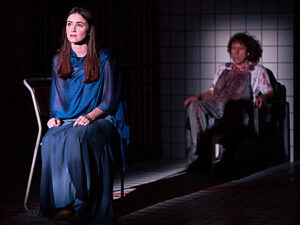
There are a lot of serious issues in there, aren’t there?
“There are: Race, alcoholism, drug abuse.
“There are a lot of sensitive human beings there in this world who have been exposed to a lot, and they collide.
“And it’s important when we’re having these conversations that the rehearsal room is a safe space.
“We can all have chats and opinions and not edit our thoughts, just put it all out on the table and go, ‘Right, what are we trying to say here?’
“It’s not about educating an audience.
“It’s not about being political or having major views, it’s always about the human beings telling the story at the end of the day.
“Because you can talk about all these things but then you just have to let them sit and then you tell a story.
“I think it’s quite interesting now when we share it with an audience.
“Obviously, different things in the play will ring true for different people.
“When people pick up on different things, it means something to themselves.
“It’s always interesting to have a conversation with an audience member afterwards.
“People are moved by different things, people are tickled by different things and that’s the community of theatre.
“The audience will educate you.
“You tell a story, they’ll educate you about what sits with them well and what makes them uncomfortable, or what makes them laugh or cry.
“I think it’s interesting because the writing is new.
“When something is new, you’ve not sat down and gone, ‘Oh, well, this is what it’s supposed to be. This is how it’s received. These are the views on it’.
“You just have to make up your mind yourself.
“People go, ‘I don’t know how to feel. There’s lots of very grey areas in it so am I supposed to like that person or not?’
“You want to put a label on characters and people, and that’s not how it works.
“The audience have to make up their minds themselves and I think that’s gold.
“That’s exciting.
“That’s magic because you don’t know.
“You can’t project what the thing will be or what you want, you just do it.
“You just do your work and see,” Judith says. “And hope,” she adds with a laugh.
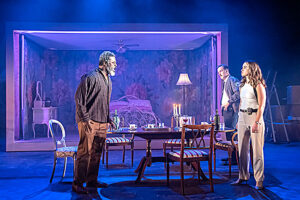
What was it like to feature in Derry Girls and as such a striking character Ms De Brun?
“Do you know what? It was great.
“That show was well established and hugely successful before I got anywhere near it.
“I arrived as a guest character in the first episode of the second series, and they hadn’t had guest characters yet so there was an anticipation of who the guest characters were, what they were going to be and there was lots of press around that.
“So they paved a pretty handy walkway for me there but it was also a really good craic character.
“Ms De Brun was a big presence.
“It’s good to get roles like that.
“The reception for that was mad, absolutely mad. I’ve never really experienced anything on that level before.
“I don’t do social media or anything like that.
“It was around that time I came off Instagram.
“I was like, ‘I can’t handle this. I’m off. I’m signing off of social media and stuff, I’m just going to do my job’.
“And I haven’t been on social media since.
“It had that kind of outpouring.
“People just love that show and rightly so.
“I love Derry Girls, I was really proud to be a part of that.”
It was in 2020 you did the two hander The Visiting Hour, a new play from Frank McGuinness where you shared the stage with Stephen Rea..
“It was great.
“I’ve worked with Stephen a couple of times.
“I love him to bits, he just got his lifetime achievement award and rightly so.
“Stephen’s one of our country’s greatest and we had talked together before about doing a two hander.
“(But) Stephen’s always busy obviously.
“And then when lockdown happened, I had a conversation with him.
“I was like, ‘Should we do something?’
“He was like, ‘Absolutely’.
“So we thought, ‘Let’s do something new’.
“So Frank McGuinness wrote us that play which is obviously an absolute gift.
“I’ve worked with Frank a few times before as well.
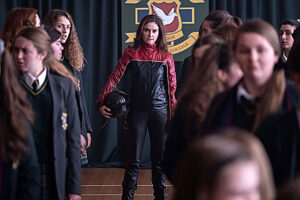
“And then we asked Caitríona McLaughlin, who’s the artistic director of the Abbey, to direct it.
“It was just good to steer your own ship.
“It was lockdown and we wanted to combine the worlds of filming and theatre so we did it on an empty Gate, the big chandelier and a pane of glass between the two of us.
“It was just two actors doing their thing with each other.
“It wasn’t without its challenges because obviously it was a very challenging time.
“I’m so proud that I engineered that.
“It just makes you think, ‘Okay, well what else am I capable of?’”
Judith had not acted at Hampstead Theatre prior to this opportunity.
“Who doesn’t want to be in Hampstead in the summer?
“I go and I walk around Hampstead park before we go to rehearsal and I fully intend to be in the pond in between shows.
“It’s really nice to be back on the stage.
“I’m a theatre actress, born and bred off it.
“We’re here to tell a story and that’s what we do.
“It’s fantastic.”
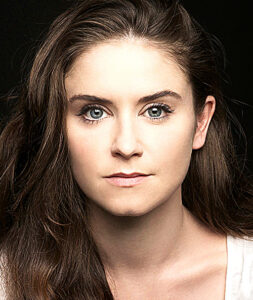
London has been your base for some time now, hasn’t it?
“It has been for a long time.
“I bounce over and I do little bits and pieces in Dublin because Dublin has been home to me for a long time.
“I studied there.
“I worked there for a long time and there’s companies and people that I really value there so I will always bounce over because at the end of the day, I’m an Irish actress.
“I want to also work in my own country as well.
“I was trained in Ireland and I very much love going back, love it.”
We didn’t really talk about the Translations production you were part of at the National Theatre back in 2019…
“It’s one of those ones that I will just cherish.
“Ciarán Hinds is one of the finest actors and he’s a total gentleman. I just really looked forward to going to work. It’s not work.
“It’s amazing when you’re in a room in London and people know Brian Friel inside out.
“They want to tell the story, and they’re not necessarily Irish.
“I just love that.
“We did Translations in 2018 and that was sold out and then we brought it back again.
“I was more than happy to jump back on that stage with Dermot Crowley and Ciarán Hinds.
“Yeah, it was special.”
Do you feel blessed because already in this conversation we have mentioned greats like Ralph Fiennes, Stephen Rea, Ciarán Hinds and Dermot Crowley. You have worked with some great people..
“I know.
“And then people pass on as well.
“Sam Shepard passed on and we put on a tribute to him in the Royal Court.
“We were in New York with Sam celebrating his birthday, and he’d write these little bits of poetry and he’s sitting in the corner on his typewriter. You can’t even take moments to clock what’s happening.
“You’re going, ‘There’s Stephen Rea and there’s Sam Shepard’. It’s mad.
“But I think I try not to reflect too much or project too much. “I just try and put one foot in front of the other and focus on the job in hand.
“Every so often you’ll get goosebumps.
“To me, it’s a gift to have a freelance life. I call it being a salmon going upstream.
“Because I live in Brixton, when I’m walking down Brixton Hill, and I see everyone jumping on buses and stuff going to work and I’m going along with the coffee to rehearsal walking in the opposite direction.
“I go, ‘I’m lucky. I get to go upstream’.
“I feel very lucky.”
Between Riverside and Crazy is at Hampstead Theatre until 15 June.
For more information and tickets, click here.



